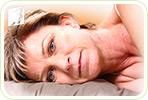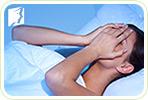Night sweats are a symptom of menopause where you wake at night drenched in sweat. A nocturnal equivalent of hot flashes, night sweats are a troublesome menopause symptom that occurs due to hormonal imbalances in the body. Your body falsely detects an increase in body temperature and produces sweat to cool down. Night sweats are unpleasant and disruptive to sleep. Read on to learn which home remedies reduce night sweating.
Keep Your Bedroom Cool
Keeping your room cool reduces the probability of sweating during the night. Ensure that you don't have excess bedding that could exacerbate sweating, open a window to improve ventilation in the room, and avoid sleeping with the heater on. Keeping a cold glass of water by your bed is a quick way to cool down if you wake up sweating, as well as to replace any fluids lost.
Sage
Sage has been shown to have sweat-reducing properties, making it valuable for treating night sweats. Consuming sage as a tea before going to bed could significantly reduce sweating, and its warming and soothing properties are likely to help you sleep soundly.
Consider Your Diet
Products that contain phytoestrogens, such as soymilk and tofu, have been found to boost the body's levels of estrogen, which could help regulate the hormonal imbalances driving night sweats. It's also advisable to cut down on alcohol and caffeine intake before going to bed, which can increase sweating and disrupt sleeping patterns.
Consider Your Nightwear
Nightwear made from synthetic fabrics (e.g., nylon and polyester) may create an unpleasant feeling of clamminess after sweating. Sleeping naked or in nightwear made of a non-synthetic material (e.g., cotton) are more hygienic alternatives that allow the skin to breathe.
Be Aware of Personal Hygiene
You may not be able to prevent night sweats from occurring altogether, but if you experience regular sweating, it's important to adopt good personal hygiene habits to prevent the spread of bacteria and body odor. Ensuring you change your nightwear and bedding regularly will prevent a buildup of bacteria and lessen the likelihood of body odor. Furthermore, shaving your armpits regularly will stop bacteria getting caught in armpit hair, which can contribute to body odor. Showering after sweating will wash away bacteria and help you feel fresh after unpleasant clamminess.
Making small lifestyle changes, such as changing your diet, nightwear, and bedroom may help you enjoy a comfortable night's sleep free from night sweats.
Sources
- Bommer, S. , Klein, P. & Suter, A. (2011). First time proof of sage's tolerability and efficacy in menopausal women with hot flushes. Advances in Therapy, 28(6), 490-500. doi:10.1007/s12325-011-0027-z
- National Health Service UK. (2014). Symptoms of the menopause. Retrieved January 14, 2015, from http://www.nhs.uk/Conditions/Menopause/Pages/Symptoms.aspx




